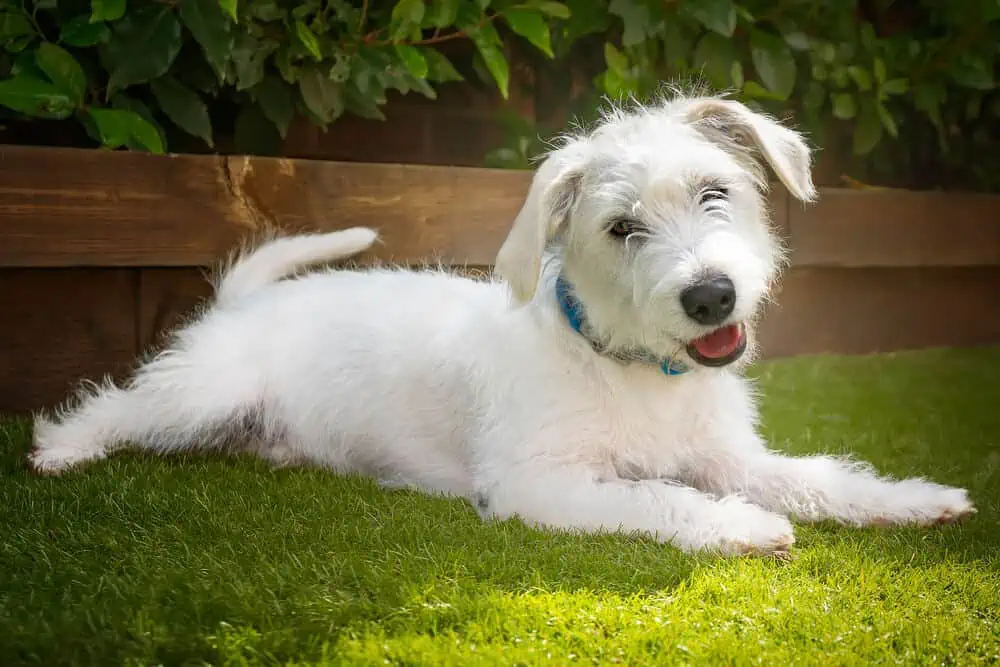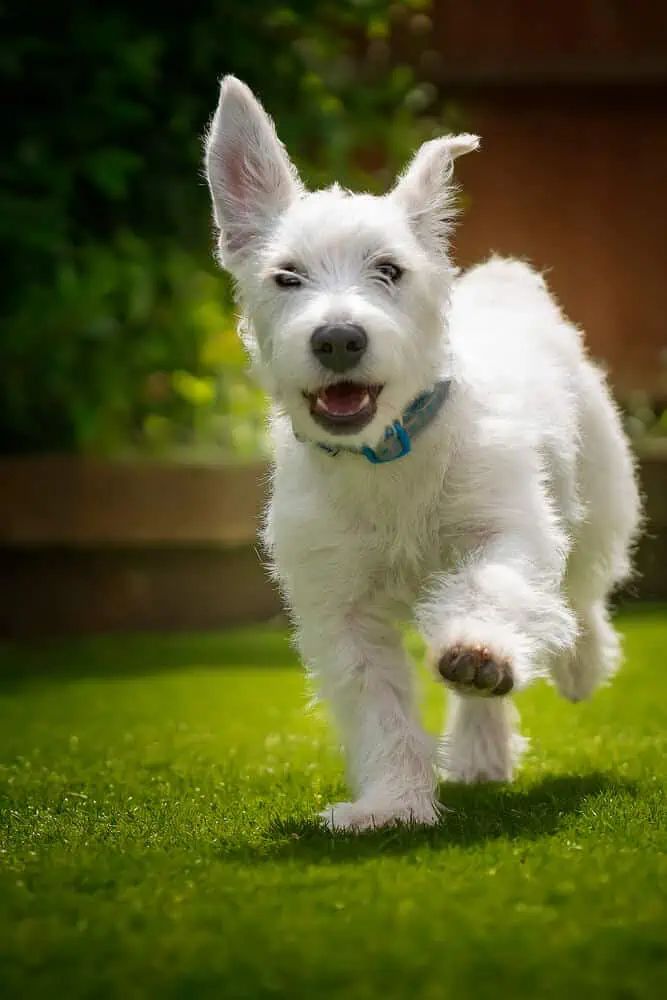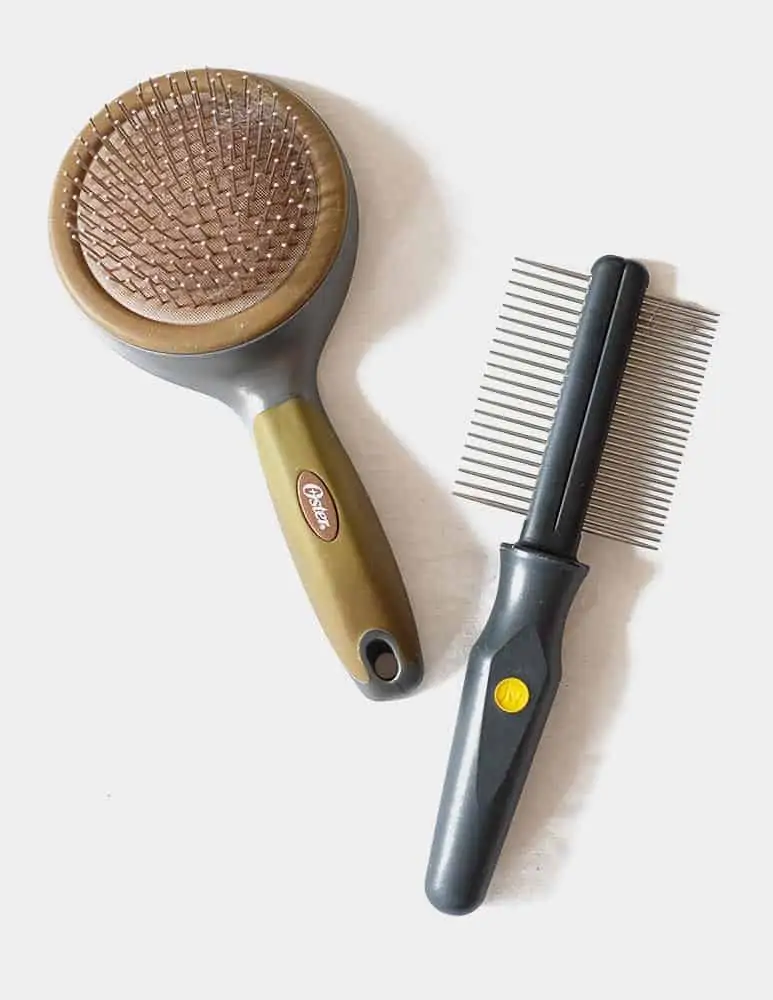Last Updated on
The Jackapoo is a delightful mix of a Jack Russell Terrier and a Poodle. This charming and affectionate hybrid breed is adored for its cute looks, lively nature, and intelligence.
Given its friendly demeanor and outgoing personality, the Jackapoo is a great companion for people of all ages, including families, singles, and seniors.
But you might be surprised to know that despite the Jackpoo being a wonderful dog, it’s not the best dog for everybody.
In this article, I want to explore the characteristics of the Jackapoo and discuss who the Jackapoo is for, and who might want to reconsider.
| Jackapoo characteristics | |
| Height | 10 to 16 inches |
| Weight | 13 to 25 pounds |
| Lifespan | 12 to 15 years |
| Temperament | Fun, smart, playful, loyal, energetic, stubborn |
| Price | $1,000 to $2,500 |
What is a Jackapoo?

A Jackapoo, also known as a Jack A Poodle, Jack a Poo, and Jack a Doodle, is a mix between a Miniature Poodle and a Jack Russell Terrier. It’s a small dog with plenty of energy who loves to play with people and other dogs. Jackapoos are one of the many different types of Doodle dogs.
Some refer to Jackapoos as “designer dogs” which is just a fancy way of saying they are a mixed breed.
Jackapoo temperament
Before we dive into the temperament of the Jackapoo, it’s important to understand the temperament and personalities of both the Poodle and the Jack Russell Terrier. Knowing the parents can help you better understand what a Jackapoo is like.
Miniature Poodles

Toy Poodle
Poodles come in three varieties: standard, miniature, and toy. For the Jackapoo, the Poodle is usually a Miniature Poodle, but can also be a Toy Poodle. Toys are the smallest, so if you want a tiny dog you’ll want to find a Toy Jackapoo.
Miniature Poodles may look regal, but they were initially bred to “hunt” and seek out wild mushrooms. As such, Poodles are fantastic sniffers. However, nowadays Miniature Poodles are bred for companionship and while they enjoy sniffing and working, they also enjoy the company of their owners.
Poodles are extremely intelligent, active, and fast learners, and many Poodle owners attest to their intelligence by describing them as intuitive and easy to train.
Jack Russell Terrier

Jack Russell Terriers were also bred as hunting dogs in England. People used Jack Russells for hunting small games like rabbits, foxes, and birds. Like Poodles, the Jack Russell is also energetic and dislikes sitting still for too long.
Due to their hunting instinct, they love to stay engaged and require plenty of mental enrichment throughout the week. Providing a Jack Russell with enough mental enrichment can be challenging if you’re busy and don’t have the time to dedicate to training.
However, putting in the time to give a Jack Russell menta stimulation and games is essential, otherwise they may become destructive (think chewing your shoes or gnawing on your baseboards).
Jackapoo

Now that you know a bit about the parents, let’s dive into the temperament of the Jackapoo dog breed.
Energetic
Jackapoos are very active, which is a no-brainer considering the parent dogs are also highly energetic.
If you plan to give your Jackapoo puppy a bunch of toys and expect them to be happy, the Jackapoo is not the right dog for you. Jackapoos need lots of attention and active participation from their owners.
Jackapoos are ideal for active families who plan to take them on walks throughout the day. At least 60 minutes is ideal, along with training and mental stimulation.
Social
Jackpoodles are great family dogs. They love being around people, and socializing them with your neighbors and other dogs won’t be an issue.
However, Jackapoos tend to inherit the prey-drive from their Jack Russell Terrier parent and may not be suitable for homes with cats or other pets that aren’t dogs (like hamsters and bunnies).
Intelligent
As both Jack Russell Terriers and Mini Poodles are highly intelligent, the Jackapoo is one smart cookie The Jackapoo is quick on the uptake, easily learning new tricks and family routines, and even sniffing out friends and foes.
Surprisingly, this small pooch makes a great guard dog. Their bold bark and unwavering confidence are sure to scare off any unwanted visitors.
Stubborn
Despite being intelligent and easy to train Jackapoos also have a stubborn streak, which means you need to have plenty of patience with them.
Their stubbornness can also make them a bit of a handful to handle, so it’s crucial to give them plenty of training from an early age. With the right training, you can teach your Jackapoo to listen to your commands and—in most cases—listen to you.
But don’t be surprised if your Jackapoo doesn’t always want to listen to what you have to say!
Loyal
Jackapoo dogs are known for their unwavering loyalty to their owners. These loving pups form strong bonds with their human family members and will go to great lengths to protect them.
They are highly affectionate and thrive on attention, and can be anxious when you leave. Jackapoos do best when they aren’t left alone for long hours at end, and if you have demanding job, you may want to reconsider the Jackapoo.
Jackapoos are also highly intuitive and can sense when their owners are feeling down or stressed, providing them with comfort and support.
Digger
Alright, so “digger” isn’t technically a type of temperament, but it’s worth noting that Jack Russell Terriers LOVE to dig, and so do Jackapoos.
Dogs dig for a variety of reasons, but the biggest is for stress relief and boredom. If you have a backyard and your Jackapoo is bored, you can bet they’ll start digging.
You can easily correct this behavior by ensuring you provide plenty of mental and physical stimulation.
Exercise and training
To keep your Jackapoo happy and healthy, you’ll need to make sure they get plenty of physical exercise every day (as mentioned, 60 minutes is typically enough).
Take your pooch for a walk in the park, but don’t stop there—to really challenge their mind, try playing games like frisbee, dog sports, or agility training. And while you’re at it, teach them some cool tricks beyond basic commands like crawl, play dead, and whisper (which is a quiet bark).
Both Poodles and Jack Russell Terriers enjoy swimming, so if you want to mix things up, take your Jackapoo for a swim. It’s a great way to burn off some energy and keep your pup cool on hot summer days.
Appearance
Colors
Prepare to be charmed by the colorful colors of the Jackapoo puppy! These playful pups come in a variety of colors, including black, white, grey, blue, brown, tan, and even mixed shades. With muscular bodies inherited from their Jack Russell Terrier parent and a coat that resembles their Poodle parent, these pups are truly one-of-a-kind.
Coat
A Jackapoos coat depends on genetics, but typically, they have a wiry coat, giving them a scruffy and cute appearance. However, they can also have wavy and curly coats, thanks to their Poodle genetics. It’s also important to note that the amount they shed largely depends on their coats.
Height and weight
Weighing between 13 to 25 pounds and growing to a height of about 10 to 16 inches, Jackapoos are the perfect size for any home.
Grooming

The Jackapoo’s curly coat requires regular brushing to prevent tangling and matting. A daily brush is ideal, but at the very least, it should be brushed once every two to three days. This will help to distribute the natural oils in their coat, keeping it shiny and healthy.
You can try grooming your Jack a Poo at home, but you’ll still likely need to head to a professional every six to eight weeks. This ensures that your dog’s coat is trimmed, neat, and clean.
A professional groomer will also clean your dog’s ears, teeth, and nails, areas that can be difficult to clean at home. This can prevent common issues such as ear infections, tooth decay, and overgrown nails that can cause discomfort to your furry friend.
It’s important to note that Jackapoos are prone to ear infections due to their floppy ears (just like their Poodle parent). It’s essential to clean their ears regularly to prevent any build-up of wax or debris that can lead to infections.
This can be done with a warm cotton cloth and a cleaning solution recommended by your vet or groomer. As for plucking the hair from their ears, that’s something you should ask your vet about. Some vets recommend plucking while others don’t. (Ours doesn’t recommend plucking for our two Doodle, and instead, we make sure to clean their ears with solution regularly).
Another crucial aspect of maintenance is dental care. Regular brushing of your Jackapoo’s teeth with dog toothpaste and a soft-bristle toothbrush can prevent dental problems like cavities, gum disease, and bad breath. It’s important to start brushing their teeth when they are puppies, so they get used to the process.
Finally, keeping your Jackapoo’s nails trimmed is crucial for their health and comfort. Long nails can cause pain when walking or running and can even lead to joint problems over time. A general rule of thumb is to trim your dog’s nails every four to six weeks, but this can vary depending on their activity level. Walking on concrete can file their nails down so if you’re going on lots of walks on sidewalks, you may not need to trim their nails as often.
Health problems
Jackapoos are susceptible to the same health problems as their parent breeds. A good breeder will screen for these diseases and won’t breed dogs that have them, but in some cases, some of these diseases are natural and happen regardless of breeding. Here are some health problems known to Jackapoos:
- Hip dysplasia is a genetic condition that affects the hip joint and can lead to arthritis and lameness in Jackapoo dogs. Regular exercise and a healthy diet can help prevent this condition, but if your dog is diagnosed with hip dysplasia, medication, surgery, or other treatment options may be necessary.
- Epilepsy is a neurological disorder that can cause seizures in Jackapoo dogs. While there is no cure for epilepsy, medication and lifestyle changes can help manage the condition and improve your dog’s quality of life.
- Addison’s disease is a hormonal disorder that can affect Jackapoo dogs, causing lethargy, vomiting, and other symptoms. Treatment for Addison’s disease involves lifelong hormone replacement therapy.
- Cushing’s disease is a hormonal disorder that can cause Jackapoo dogs to drink and urinate excessively, gain weight, and have skin and coat problems. Treatment options for Cushing’s disease include medication or surgery.
- Hypothyroidism is a condition where the thyroid gland doesn’t produce enough thyroid hormone, which can lead to weight gain, lethargy, and skin and coat problems in Jackapoo dogs. Treatment for hypothyroidism involves hormone replacement therapy.
- Patellar luxation is a condition in which the kneecap pops out of place, causing pain and limping in Jackapoo dogs. Mild cases may not require treatment, but severe cases may require surgery.
- Skin disease can affect Jackapoo dogs, causing itching, redness, and other symptoms. Causes of skin disease can vary, including allergies, parasites, or infections. Treatment options depend on the underlying cause of the skin disease.
- Cataracts can develop in Jackapoo dogs, causing cloudy or blurred vision. Treatment options may include medication, surgery, or other management strategies, depending on the severity of the cataracts.
Cost
A Jackapoo usually costs anywhere between $1,000 to $2,500. The cost depends on factors like parent breed history and whether the puppy is dewormed, vaccinated, spayed, or chipped.
That’s just the initial cost—it’s estimated that the annual cost of owning a dog is between $2,000 and $9,000 (roughly).
You can cut these costs with things like pet insurance, although, the jury is still out on whether pet insurance actually saves money in the end.
Where to find Jackapoo puppies
Breeders
Being that Jackapoos are hard to find, finding a reputable breeder can be even more challenging.
Start by researching breeders online and reading reviews from previous buyers. Visit the breeder’s facility and inspect the living conditions of the dogs. A reputable breeder should allow you to meet the puppy’s parents and provide you with all necessary health records.
Avoid breeders who sell puppies at unusually low prices or don’t allow you to visit their facilities. A reputable breeder will prioritize the health and welfare of their dogs over profit.
Rescues
Many people don’t realize they can find plenty of Poodle mix dogs in rescues! I put together a list of Doodle dog rescues to help you find a Jackapoo available for adoption.
Alternatively, you can call up Jackapoo breeders and ask to have your name put on an adoption list. Oftentimes, breeders will take back the dog if the family they sold it to can no longer care for it.
You shouldn’t get a Jackapoo if…
You shouldn’t get a Jackapoo if you’re not ready to commit to a high-energy dog with a high prey drive. Jackapoos need lots of stimulation, both physical and mental, in order to be happy.
Aside from that, they also need someone who can put in the time to care for their non-shedding coat, which requires plenty of brushing and trips to the groomers.
However, if all that sounds doable, then you’d likely make a great Jack a Poo parent!
Wrapping Up
If you want an active, adorable, intelligent, and minimally shedding dog, The Jackapoo might just be the dog you’re searching for.
Jackapoos are energetic, fun, and love to be by your side. You’ll always have a loyal companion if you choose to add a Jackapoo to your family!
FAQs
No, the AKC does not recognize the Jackapoo. The Jackapoo is recognized by the American Canine Hybrid Club and the Designer Breed Registry.
No, Jackpoodles don’t shed a lot. But they require lots of brushing and grooming.
Jackapoos are suitable for first-time dog owners as long as they can commit to daily exercise and training!
This article may include affiliate links. www.travellingwithadog.com is a participant of Amazon.com Services LLC Associates Program. As an Amazon Associate, I earn a commission from qualifying purchase. www.travellingwithadog.com participates in other affiliate programs, and recieves commissions when purchases are made through the links. The cost is not inflated to account for the commission earned.
Veterinary Disclaimer: travellingwithadog.com is not a substitute for veterinary advice and does not intend to provide any type of veterinary advice for your animals. Please consult your vet for any questions you have regarding your pets health.

About the Author:
Dana owns a Sheepadoodle and a rescue merle Labradoodle. Her first dog growing up was a white Toy Poodle and she’s loved dogs ever since. She has years of experience fostering dogs and has helped find homes for a variety of different breeds, both large and small! After seeing so many dogs end up unwanted and in shelters, she began blogging about different dog breeds (specifically Doodle dogs, since that’s what she knows best) to help people make informed choices when adding a new member to their family.
When Dana’s not brushing her Doodles’ hair (it takes a lot of time for two!) you can find her playing nose work games and fetch with her two amazing pups.
Learn more about her here.

